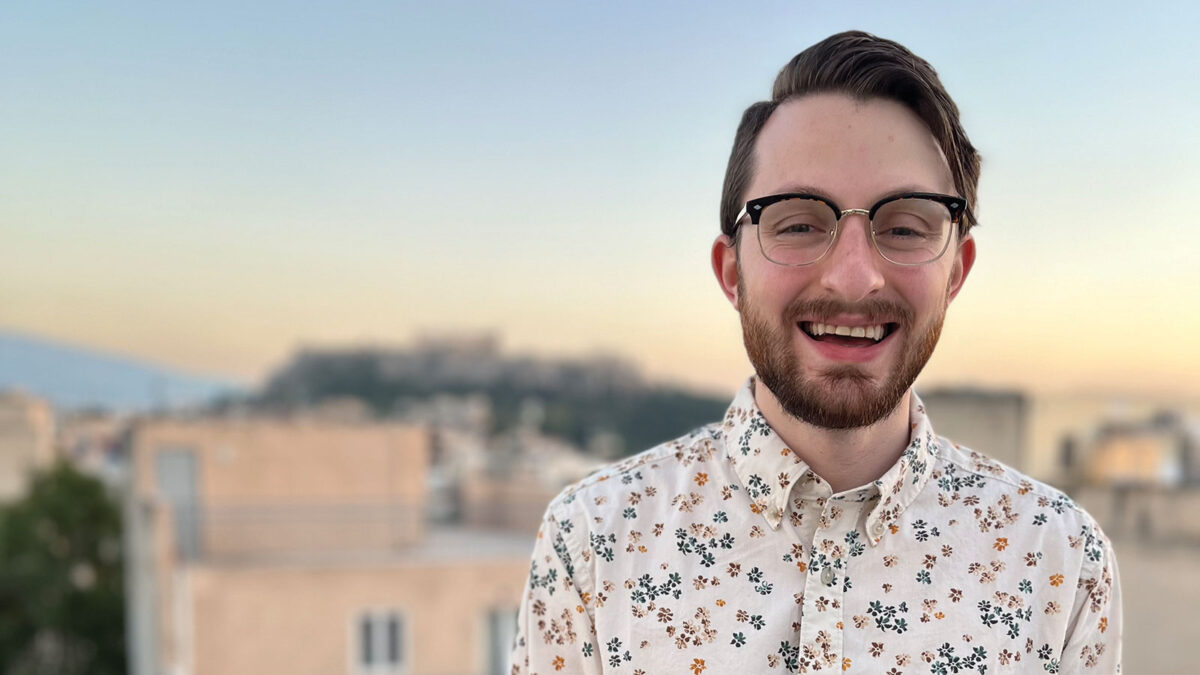
Flexibility Required
Award Recipient Jackson Laughlin’s Ability to Adapt Is His Key to Success
January/February 2024
Download This Article (.pdf)
This year’s Outstanding Young Lawyer of the Year, Deputy Public Defender Jackson Laughlin, could teach a master class on going with the flow. He may have been adaptable before the pandemic, but having been a student in his last semester of Harvard Law when the COVID-19 quarantine hit and then a young lawyer starting his career just as online meetings became the new normal, these days he’s practically elastic. The disruption was major, but he was able to roll with it. “Our classes went fully remote in mid-March 2020, and shortly thereafter the university informed us that they would stay remote and that our grades would all be pass-fail. So, we attended Zoom class every day. My wife and I were enrolled in three classes together, so we had to be on Zoom calls in the same small Boston apartment, but from separate rooms.”
Remote Work Challenges Build Resilience
Laughlin and his wife, Dilyn Myers, also now a public defender, adapted well to attending school and socializing remotely. Laughlin says Dilyn, who works on appellate cases, is “very much my rock and supports me through everything. She is, herself, an outstanding young lawyer and an amazing person.” Through Zoom, they kept up with law school friends and even strengthened relationships with friends from their native Colorado, meeting frequently for game nights. But when they entered the workforce, they found the challenges ratcheted up.
“My first job, at a small plaintiff’s firm, was fully remote. That made it really hard to engage with any of my coworkers, most of whom were out of state. I was very isolated and unhappy in that job. I left as soon as my clerkship materialized,” Laughlin says. There, he worked primarily from the courthouse while his co-clerk and judge were remote unless they had court.
As for the matter of virtual court, Laughlin saw just how difficult it was for his clients. While it was a boon for those with limited transportation to be able to simply log on, “many individuals involved in the criminal justice system have limited access to technology. When I first started as a public defender, we would run into a problem where our clients did not have phones—so we couldn’t speak to them before court—but they would call in to court on a borrowed phone—so I wouldn’t be able to speak to them in court. And then their cases couldn’t progress,” he says.
“Once everyone was ordered to return to court in person, we were able to speak with our clients and therefore resolve more cases, which reduced our caseloads significantly and made the job less taxing. I think Webex is an excellent tool, but in-person court appearances remain my preference.” Keeping his lifelong desire to do meaningful work in focus has helped Laughlin adapt to these rapid logistical changes and other challenges along the way.
Finding His Path
Laughlin says that a career as a lawyer had been on his radar ever since he was a kid. “When I was little, I liked to make up stories and was known to be a little bit argumentative. My family always told me I should be a lawyer, which is kind of a mean thing to say to a kid if you think about it.” High school debate was what pushed him to formalize his decision. “It was the first time I realized I could make a difference by using logic, research, and persuasive speaking. I had a high school debate coach, Natalie Sprigg, who pushed me to be an excellent debater. She didn’t have any legal experience, but she helped me develop the skills that made me become a lawyer.”
Laughlin attended law school straight out of undergrad. “Overall, I was not the biggest fan of law school itself, in part because I felt out of place while there. I’m from Colorado and I went to undergrad in Kansas, so I had a hard time transitioning to Harvard Law. I was very young compared to my peers and not used to the idiosyncrasies of the East Coast. Beyond that, I did not relate to many of my classmates. Many of my peers came from more money than me and they had family members who were attorneys. I felt like a fish out of water for my first year. Ultimately though, I met many amazing people, including my wife, Dilyn, while I was there, and I am thankful for the experience and what I learned from it.”
Upon graduating, Laughlin intended to join the Colorado Public Defender’s Office, but during the pandemic, they could not place him. Consequently, he spent the first few months of his practice at a small plaintiff’s side firm and then clerked for Judge Kenneth M. Laff in Denver until Laff’s retirement.
Laughlin joined the Public Defender’s Office in June 2021. By then, the pandemic had made its mark on him. “Staying inside for months at a time led me to become quieter and more thoughtful. In general, I’m still a fairly gregarious and extroverted person, which helps when you’re a public defender. But I’ve learned to be less hot-headed and more willing to listen before I act. That filters over to my work, where I strive to listen to my clients, peers, and judges before I speak these days. And in general, I have become much more of a writing lawyer than a talking lawyer as my practice has developed, and I think that is also related to the pandemic.”
Laughlin admits that being a public defender is an incredibly difficult job. “I enjoy it, and it’s hard for me to see doing anything else, but my clients are often in situations that are not sustainable. I’ve worked really hard to try and compartmentalize my cases so I don’t bring them home with me, so to speak. As my cases get more serious, or as I become more invested, that becomes more difficult. Certainly, my cases where clients are facing significant sentences weigh on me heavily, and I would be lying if I said I was able to fully distance myself from them. I don’t know any public defenders who aren’t torn up inside about bad sentences or unfair decisions, let alone trial losses. I would be lying if I said I didn’t get emotionally invested in hard cases and take it hard when difficult things happen. The pressure of having someone’s freedom—and in many ways, life—in your hands is a lot.”
Looking Ahead
The challenges of being a public defender have opened Laughlin’s eyes to many aspects of the criminal justice system that could benefit from reform. “There are inadequate sentencing mechanisms in place to rehabilitate individuals charged with crimes or to protect the public. I can count on one hand how many cases I have had—out of thousands—that are not the result of poverty, mental illness, substance use, or some combination thereof. Frankly, 99% of people who are charged with crimes would not have engaged in criminal conduct if society had provided them more structure and resources in their lives. Ultimately, our system needs significant reform in providing resources to the indigent, providing effective—and free—substance use and mental health treatment, and providing education. Our community would be far safer if we invested resources into providing those things before someone’s involvement in the criminal justice system, rather than trying to deal with crime on the back end. In short, our system needs to focus on creating stability, rather than using punitive sentencing mechanisms that further destabilize and make the community unsafe.”
It is something that he looks forward to tackling during the course of his career. “I’m interested in working more on legislative reform in the coming years. While I find being a public defender incredibly satisfying, my profession primarily functions as a Band-Aid to assist those in the criminal justice system who are there due to structural failures of our country. I’d like to be able to dedicate my time toward changing laws and securing funding for programs to help people avoid becoming entrenched in the criminal justice system to begin with. Whether that’s through lobbying, working with advocacy groups, or working directly in legislation, my goal is to try to accomplish big-picture structural reform someday.”
Laughlin’s capacity not only to adapt but to thrive during uncertain times has served him well. His ability to build meaningful personal and professional relationships and his passion to effect positive change make him a worthy recipient of the Outstanding Lawyer of the Year Award.


